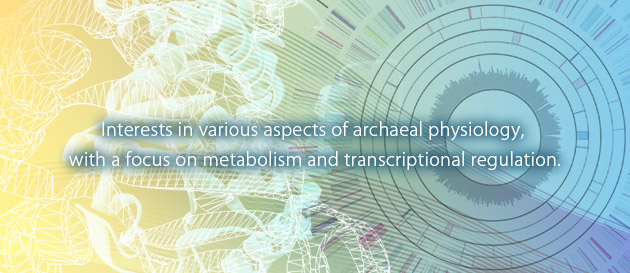 Welcome! †Our group is engaged in research on microorganisms, particularly members of the Archaea. Archaea are a group of organisms that are phylogenetically distinct to members of the Bacteria and Eucarya. They are a diverse group of organisms and include the methanogens, halophiles, hyperthermophiles and many others. Members of the archaea exhibit many biological features not found in bacteria and eukaryotes. One example is their membrane lipids, which consist of isoprenoid chains linked to the glycerol carbons by ether bonds, whereas in bacteria and eukaryotes, straight chain fatty acids are linked to glycerol by ester bonds. The stereochemistry of these linkages also differs between archaea and bacteria/eukaryotes. Archaea, although similar to bacteria in size and shape (without a nucleus), harbor a number of features that resemble those of eukaryotes. This includes the machinery involved in DNA replication and basal transcription. Archaea also utilize a number of metabolic pathways not found in bacteria/eukaryotes. We are interested in various aspects of archaeal physiology, with a focus on metabolism and transcriptional regulation. News †2024年度 新四回生の集合日時と場所 †4/4(木)10:00 桂キャンパスA4棟216号室に集合 (2Fラウンジにて顔合わせ、その後、研修の予定) The 11th International Congress on Extremophiles (Extremophiles2016) was held at Kyoto University from September 12 to 16, 2016. †Awards †Poster Award †Mizuna Kittaka Poster Award †Riku Aono Poster Award †Mizuna Kittaka Young Scientist Award †Takaaki Sato Poster Award †Hiroya Tomita Poster Award †Hiroya Tomita Poster Award †Takuya Ishibashi Young Scientist Award †Tamotsu Kanai Poster Award †Ryo Takemasa Poster Award †Ryo Takemasa |
View Edit
![[logo] [logo]](wiki/image/logo.jpg)